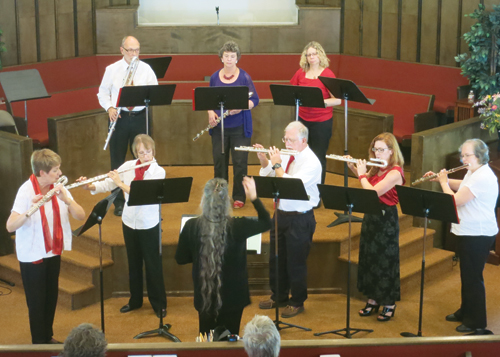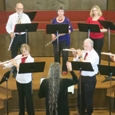
Attending a summer masterclass presents new opportunities both musically and personally. As an adult, I have attended classes to learn to play the Baroque flute, to work with an esteemed pedagogue from England, and another to learn how to play traditional music. For college I wished to study with a certain teacher, but I was not accepted to that college. However, I was able to attend his masterclasses for two summers. This exposure gave me the opportunity to learn from him and to apply his concepts to my college experience. I can say that those two summers completely changed my outlook on music and flute, making graduate school and a professional career possible.
Musically you will be able to study with different teachers and hear a wide variety of styles of playing which will ideally stretch your ideas of flute performance. Observing a master flutist teach will widen your knowledge of pedagogy by allowing you to observe the impact of teaching while enlarging your knowledge of the flute repertoire. Perhaps you will notice the difference in how some flute tones project better than others. Practicing and performing in a new environment helps you learn how to take criticism, make rapid changes in your playing, and listen more intently. Summer programs often offer a variety of additional classes such as chamber music, jazz improvisation, flute repair, body mapping, Alexander Technique, music theory, music history, performance enhancement, among others. Best of all, a summer masterclass program offers the chance to devote yourself 24/7 to music and the flute. It also offers the opportunity to meet new friends who share a passion for the flute.
Benefits for Student Flutists
Classes located on a college campus provide the opportunity to immerse oneself in a university environment and experience some independence that can be good preparation for going away to school. It gives students preparing for college a chance to experience the culture, size, and ambience of a campus. If you are interested in studying with a particular teacher at the masterclass, this allows a longer period than a single lesson to discover his or her teaching style. Often college admissions counselors are available to share information about financial aid, application procedures etc. Classes in a distant place are also an opportunity to expand your horizons.
Benefits for Adult Flutists
A summer masterclass offers the opportunity to work with a master flute teacher who may not be generally available for private lessons. Some classes are located in beautiful places that are chosen for nearby tourist attractions that provide a special ambience for the class. Other programs offer a chance to travel internationally to gain a different perspective that comes from experiencing another culture, language and artistic environment.
Masterclasses and music camps are available for flutists of all ages, abilities, and budgets. When selecting a masterclass, consider the travel time and cost as well as your experience level and preparedness. Consider the specific opportunities presented. Who is the masterclass teacher? How many performers, participants, and auditors will be there? How many times will you perform? Are private lessons offered? Are the accommodations appropriate for you?
Preparing for the Class
A month or so in advance, choose repertoire appropriate for the class. Research everything about your music, including historical background about the composer and style period, and perhaps details about the composition’s premiere. Analyze the form, the key, and make note of any unusual things that appear in the composition. Look up unfamiliar terms in the score and listen to multiple recordings of the piece. After studying the full score, read through the piece with a pianist, if appropriate. Depending on how many times you perform in the masterclass, you may need several pieces. You will glean the most information from the class if each of the selections is from a different style period and genre. Anticipate what questions the teacher may ask. Inevitably, you will be asked about the story you are trying to convey and what the piece means to you. Prepare for the class as if you are performing in a recital.
At the Class
Bring an open mind to the instruction. Expect that the teacher may share new or different concepts and novel ways of describing well-known ones. Enjoy the new perspective. Expect to invent a new practice or exercise routine and to reconsider your work ethic.
Always ask for permission to record (video or audio) your performance. If making a recording is denied, then ask a colleague to take notes for you. Then return the favor for him.
When not performing in the class, you will be listening to others. If possible bring scores of the repertoire that will be performed by other flutists. Make notes in the score or in a notebook or practice diary of the teacher’s comments. Make sure to have multiple sharpened pencils.
Plan well in advance for the private lesson segment of the program. Bring repertoire that you have prepared as well as you can, but have not yet studied with another teacher. Have a list of questions. Be ready to try new ideas.
Remember you may learn as much from watching and listening to other flutists as from performing. Say thank you three times more than you think you should, to the teacher, the pianist, and the organizer of the class.
Give It a Try
Check out the Directory of Masterclasses in this issue of Flute Talk. The masterclasses are listed by state and country. Expect to meet many people and make new friends – networking is the name of the game. The flute world is small so it is likely that you will have many mutual acquaintances.
Masterclass Organizers
If your event is not in the annual directory this month, please contact us at editor@flutetalkmagazine.com to be included in the online version and an addendum in the April issue.






